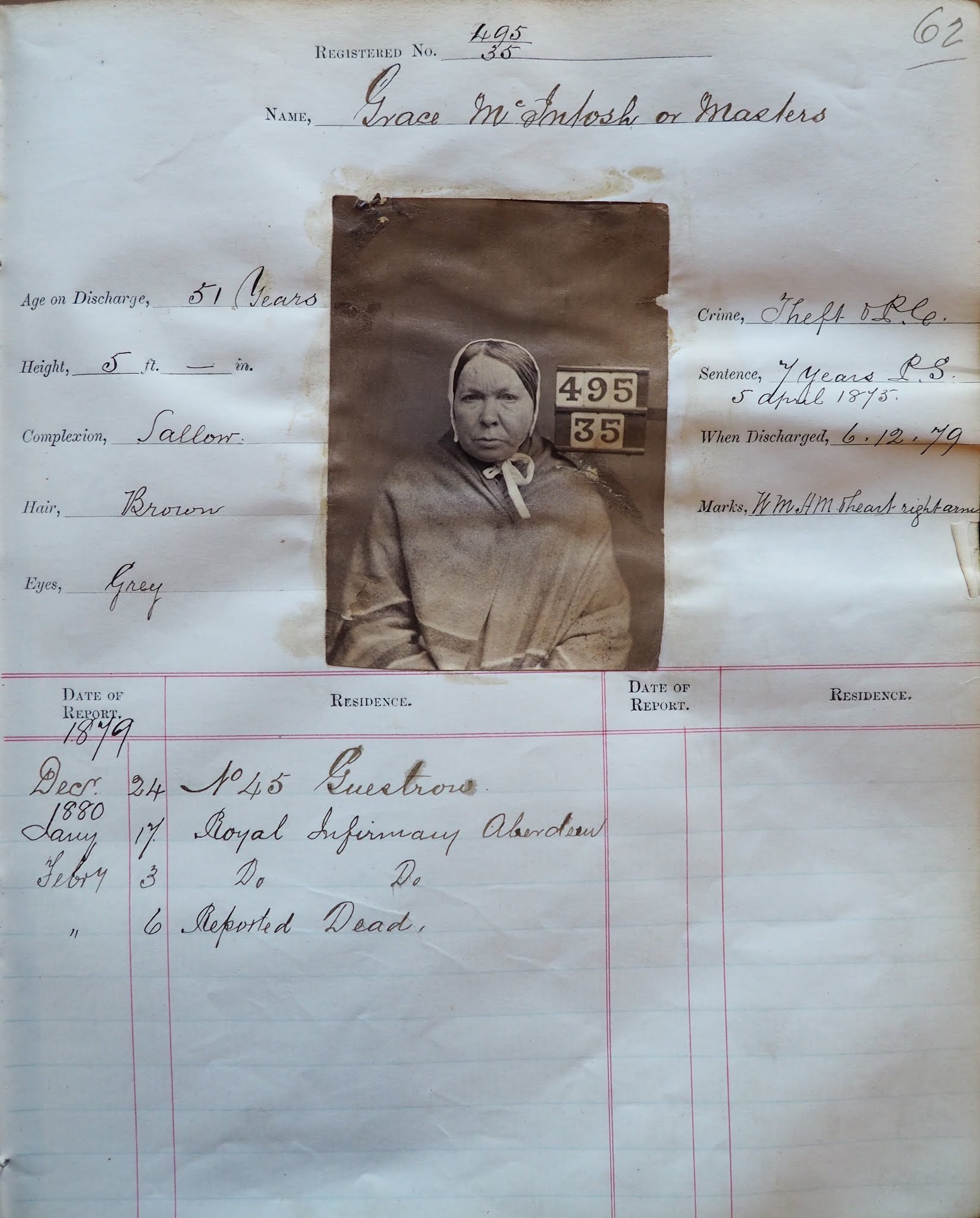To round off this month’s theme of #EYAJustice, Phil from Aberdeen City and Aberdeenshire Archives takes us on a journey to trace the story of Grace McIntosh.

Difficult beginnings
Grace McIntosh was born c.1828 in Jack’s Brae, Aberdeen, the fifth of seven children. She first came to the attention of the Aberdeen magistrates in January 1839 aged 11, when she and her 7 year old brother, were arrested for theft.

In November 1842, she was aged about 14 years when she was convicted of stealing an item of woollen underwear from a seaman in a house in Jopp’s Lane, probably a house of ill repute. Described as a prostitute in official records, Grace served 30 days in Aberdeen prison for this offence, her first taste of life behind bars.
A few months after her release, in March 1843, Grace was arrested on a charge of vagrancy. The Procurator Fiscal, Scotland’s public prosecutor, dismissed the case, and she was released after just two days in prison.
A lengthy sentence
The next entry from the Aberdeen Prison Register is in February 1844. Her offence was a crime known as ‘child stripping’, when small children were targeted for their clothes. Her two victims were aged 6 and 8 years. Grace was described as dirty and ragged but sober.
For this crime, Grace was sentenced to transportation for seven years. After 76 days in Aberdeen prison, Grace was transferred by steamer to Millbank Prison, London. Her convict ship, the ‘Tasmania’, sailed to Van Diemen’s Land (modern day Tasmania) on 8th September 1844.

She was incarcerated at Cascades Female Factory in Hobart, and in Launceston Female Factory. Although she was recorded as quiet and hardworking, Grace absconded from her workplace in June 1846 and in February 1847, but was apprehended both times. While a prisoner, she was punished with hard labour and solitary confinement on seven separate occasions.
When in Van Diemen’s Land, Grace married another convict, Aaron Masters, in August 1847. Her husband was at least 30 years her senior. Originally from Cornwall, he had been convicted of stealing livestock in 1839 and sentenced to 10 years transportation. Grace and Aaron had a child, Henry, b.1848, who died in infancy.
Grace’s return to Great Britain…
Grace was granted a Certificate of Freedom in April 1851. By August of that year she and Aaron were no longer together. On 25th March 1852 Grace sailed to Melbourne. By March 1854, then aged 25, she had amassed enough money to book a passage to London aboard the ship ‘The Prince Alfred’.
Once back in Aberdeen in 1854, Grace reverted to crime: she and an accomplice, Elizabeth Sheriffs, were accused of the theft of a number of items from the attic room of a house in McCook’s Court. When arrested, Grace told the police, “that they could not do worse to her than they had done before”, probably a reference to the punishment of transportation that she had recently endured.
Transportation was replaced by the convict prison system from 1853 onwards, with the Penal Servitude Act of 1857 providing the legal framework. The minimum length of sentence under this new Act was three years.
In January 1855, Grace appears in the ‘Return of Prostitutes for Aberdeen’, a list of prostitutes’ names and ages compiled by the Commissioners of Police for Aberdeen. It records nearly 500 women aged between 15 and 44.

… and to old habits
Three months after this list was compiled, Grace was sentenced to six years in prison. The 1861 census records her as an inmate in Perth Prison – her occupation noted as a ‘Hawker’. It is likely that the first six to twelve months of her prison sentence were spent in solitary confinement as was the system at the time.
Between 1862 and 1864 Grace was in court nine times for breaches of the peace, contravening the Public House Act and being drunk and disorderly. On another occasion she was accused of stealing a silver watch. In 1864 Grace was convicted of theft of a gown and being a habit and repute thief with previous convictions. She was given an eight year prison sentence and sent to Ayr Prison.
In April 1875 – Grace, along with her accomplice Mary Murray, were convicted of stealing £30 in cash from James Grant, a butcher whilst in a house in Rettie’s Court. Although Grace had served her sentence for all her previous convictions they were once again cited and she was given seven years penal servitude while Murray received just eight months imprisonment.
Grace was liberated on licence on 6th December 1879. The register of Returned Convicts for Aberdeen records that she was housed at the Victoria Lodging House in Guestrow from where she was sent to the Aberdeen Royal Infirmary just over a month later on 17th January 1880.

Grace died on 4th February 1880 – her death certificate records the cause of death was “bronchitis and emphysema (several years)”, and her age given as 52 years. Three days later, she was interred in the poor section of Nellfield Cemetery at the expense of the council.
Further information:
Written by Phil Astley, Team Leader, Aberdeen City & Aberdeenshire Archives.
Edited by Isabel Lauterjung, Blog Coordinator.
A more detailed version of Grace’s story can be read here.
Information about catalogues, indexes and finding aids can be found here: Catalogues and indexes | Aberdeen City Council.
